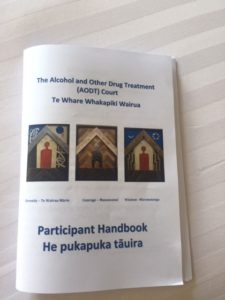In the seventh blog reflecting on the observations of our #JusticeSolutions tour of New Zealand, Jesuit Social Services’ CEO JULIE EDWARDS writes that Auckland’s Alcohol and Other Drug Treatment Court demonstrates effective justice by holding people to account and supporting them to connect with family and community.

Participant handbook at the Alcohol and Other Drug Treatment Court.
We were fortunately to witness a powerful day at Auckland’s Alcohol and Other Drug Treatment Court.
Like similar courts in Australia that aim to provide “access to fair, culturally relevant and appropriate justice”, the Alcohol and Other Drug Treatment Court in Auckland prioritises strong cultural practices.
This has been a strong feature of our experiences here in NZ – and here, today in court, was no exception. It’s apparent from the moment of welcome, prayer and song to the use of language, the symbols around the court room, the active voice of Maori elders, through to the closing prayer and song.
Maori people comprise 15 per cent of the population in NZ but make up 50 per cent of the prison population – so culturally appropriate practices are critical.
Being accepted into this court program is an alternative to a prison sentence. It is not a soft, easy option. This was stressed a number of times during the day.
It was a privilege to witness the court team work so closely together, and with such care – paying deep attention to the details of each person’s life being considered or reviewed as part of the court process. The judge, elder, police, lawyers and caseworkers all participate – bringing insights, direct knowledge, experience, legal and moral considerations to bear.
This was justice at its best – holding to account, encouraging, connecting with family and community, extending the hand of personal care and hope.
It was a privilege too, and very humbling, to witness the participants’ struggle to turn their lives around – lives overwhelmingly marked by early life abuse, neglect and violence, school exclusion, drugs, homelessness, offending. But here in this court room their struggles were on display – the lapses and relapses, the huge self- doubts, the despair. And these were met with calls for honesty, for trust in the process, for communication – always with the offer of support; never with superiority or condescension.
Each achievement was noticed, acknowledged and praised. And the wavering flame of hope was nurtured; hope for a new life, a life free from addiction, free from offending.


